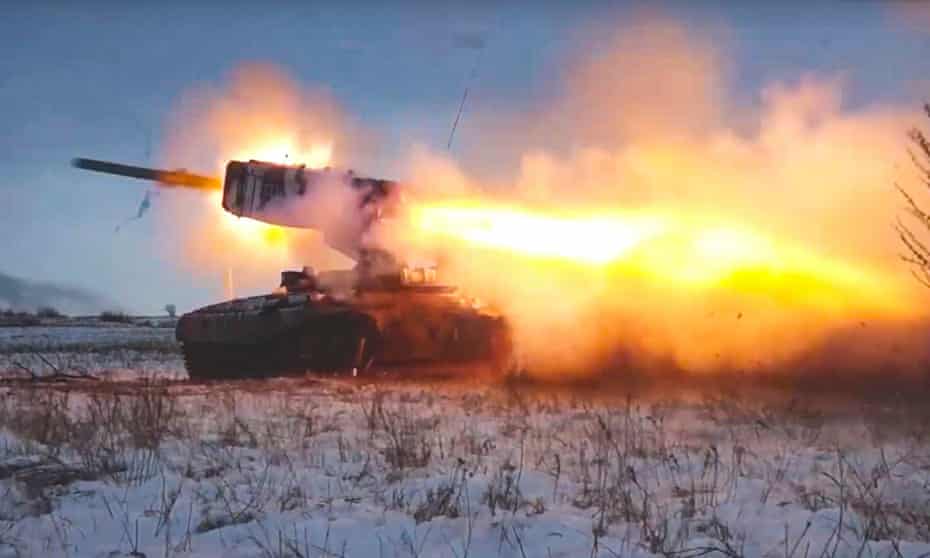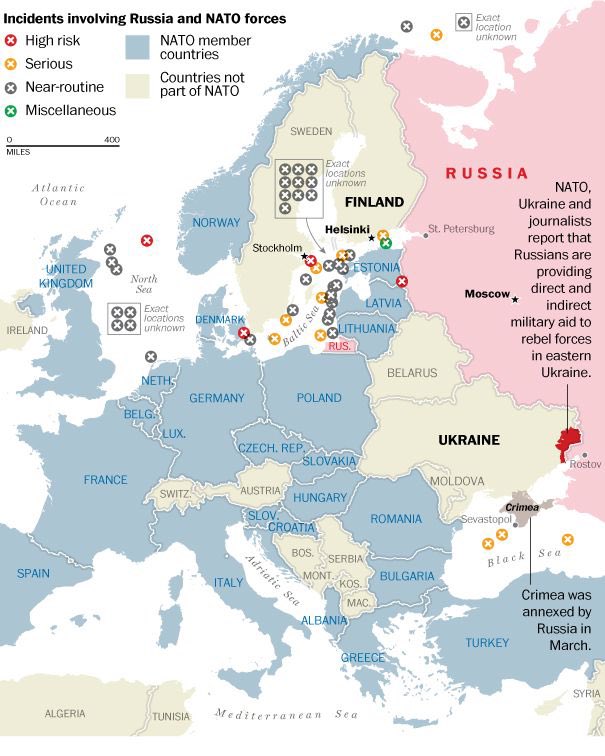The above is without question a provocative headline. The main question, however, is ‘why draw such a negative conclusion from the current geopolitical confrontation between the West and Russia?’ The reality is that Ukraine finds itself in the crossfire of geopolitical concepts regarding what the multipolar world of the 21st century should look like.
Ukraine’s fate has become a bargaining chip, one more piece on the chessboard, in Russian President Vladimir Putin’s imperialist aspirations. Ukraine seems like an object of change in the international tug-of-war in the new Cold War between the Kremlin and the free democracies of the West.
Beyond the headlines and breaking news reports, the truth is that behind Moscow’s warmongering movements there is a clear motivation: to redefine the current world order.
Putin seeks to re-negotiate the status quo of the European and global security architecture. He wants a new framework that embraces the idea that Moscow has re-established Russia’s place as a global power. Putin and the Kremlin have not, however, taken into consideration that the Russian Federation of 2022 remains a country of nearly 145 million people that has a GDP on par with that of Spain and Italy – two nations that are decidedly not global powers.
The pressure being put on Ukraine is the latest attempt by Russia to use similar hybrid warfare tactics that are aimed at pressure the governments of the countries on its borders to act in a way that is more amenable to Moscow’s wishes With this, Putin seeks to redefine the geopolitical and security framework in today’s Europe, and, in some fashion, recover the international weight that the Kremlin lost after the collapse of the Soviet Union in December 1991 – an event that Putin, a former KGB colonel, has repeatedly described as “the greatest historical catastrophe of the 20th-country”.
“House brand” strategy
Moscow’s recent troop deployments to the Ukrainian border have been ongoing for months. Russia’s military high command long ago implemented the so-called “Maskirovka Strategy”, which consists of constant deception by making their opponent believe that a full-scale attack is coming.
For weeks now the international community has come to the conclusion that Putin has decided on one of the three following plans:
a) A full-scale invasion of Ukraine is imminent and that Russia plans to capture and occupy the Ukrainian capital Kiev, thus linking all of the predominantly Russian-speaking the areas – from Donetsk, in eastern Ukraine, to Transnistria in Moldova’s east – with the Russian Federation;
b) The creation of a strip of territory that connects Donetsk and neighboring Lugansk with Russian-occupied Crimea, thus closing off the Sea of Azov to Ukraine;
c) An invasion of a part of Ukraine, up to the strategic Dnieper River, which would split the country in two.
All three of these scenarios, as possible as they may seem, are unlikely, especially if one considers Moscow’s military strategy in recent years. Putin knows that the cost of putting boots on the ground in Ukraine would be very high, surely unaffordable in terms of casualties and the overall economic impact for Russia.
The Ukrainian military has gone through a massive overhaul since 2014-15 and now has eight years of NATO training and combat experience. It is now a far more professional and formidable battlefield foe for Russia. Ukraine’s highly active civil society is both organized and experienced in mobilizing the Ukrainian public. It would not suddenly go silent after the entry of Russian troops into any of the countries major cities or towns.
If, however, the Kremlin’s current strategy of trying to squeeze the West – particularly the Europeans – into cutting a deal that is favorable to Russia’s terms doesn’t end with acceptable results, the most likely scenario will be that Moscow opts to continue adding fuel to the geopolitical fire by launching minor incursions across Ukraine’s borders, which would be a range of indirect actions that would include:
a) Cyberattacks: Ukrainian public institutions and government websites would be disabled. Average Ukrainian citizens would be subjected to data theft and the deployment of malware from Russian hackers;
b) Logistical support: The supply of weapons, ammunition and equipment to pro-Russian rebels in the occupied areas of Donetsk and Lugansk would resume on a far greater scale. This would completely destabilize the two regaions again and prevent Kiev from moving the frozen conflict in the eastern Donbass region towards stabilization;
c) Disinformation and propaganda: The Kremlin would intensify its strategy on the Ukrainian public and in Eastern Europe to polarize public discourse, open gaps and weaken the democratic process throughout the region. Russia would continue to promote political campaigns and pro-Russian candidates who would distance their respective countries away from the Western alliance and into Russia’s sphere of influence.
Ultimately, Russia will continue to strangle Ukraine in one way or another for the foreseeable future. This will inevitably lead to Ukraine being the biggest loser in the tug-of-war between the West and Russia.

The Russian obsession with Ukraine’s status as an independent state
Putin’s attitude towards Ukraine is tremendously possessive – ‘If Ukraine is not Russia’s, it will not be for anyone’. Moscow will not allow Kiev to switch its loyalties and worldview. To this end, the Kremlin wants, by any means available, to ensure that Ukraine and its people fail in their attempts to democratize and reform their country. Putin wants full control over its all of its post-Soviet neighbors and to lock them into the type dependence on Russia that exists between Moscow, Belarus, Kazakhstan and Armenia.
Attempts at greater democracy in Belarus and Kazakhstan have been harshly repressed, while Armenia’s modest moves towards detaching itself from a subservient reliance on Moscow have been met with intense resistence from the pro-Russian military and security services.
Russia is attempting to reconstitute what one would call a ‘virtual Soviet Union’ by forcing most of the ex-republics to remain firmly under the Kremlin’s sphere of influence. Putin is determined to halt NATO expansion into any of these countries and he will demand that Russia’s national and security concerns be taken into account on the global stage. From his point of view, this will include areas of the world that are far removed from the region of Eurasia and would encompass other former Cold War allies in the Third World from Latin America (Cuba, Venezuela and Nicaragua) to Africa (Angola, Algeria and Sudan).
This could also include forging an increasingly close geopolitical relationship with China, something that worries the US and UK, but also the European Union bureacracts in Brussels.
Broadly speaking, Putin is looking seeks to renegotaiate the 1945 Yalta Agreements that saw the United States, United Kingdom and the Soviet Union divide up post-war Europe into rival halves – the free, democratic nations of the West and the Soviet-dominated, Communist autocracies of the Eastern Bloc.
The role of the EU
At this point, many wonder what role the European Union can play in this crisis? Brussels, at this point, although it claims to be a decision-making global political player, is utterly bereft of the necessary tools to suggest, let alone impose, any sort of roadmap policy in regards to Russia.
The 27 members of the EU have agreed that Ukraine and its sovereignty must be respected. They have also unanimously decided that all maintaining open diplomatic channels with Moscow must be Europe’s priority. This explains why the recent Geneva meeting between US Secretary of State Antony Blinken and Russian Foreign Minister Sergey Lavrov has been viewed so favorably in Brussels.
That said, however, unimity amongst the members EU on the Russia question is hard to find. At presetnt, there are two decidedly opposing camps when it comes to relations with Moscow. In Eastern Europe – the region that once made up the bulk of the Soviet-led Warsaw Pact and who suffered from being under the Soviet yoke for decades – want to take a hard line against the Kremlin while also enhancing their commitment to Ukraine by sending offensive weapons to Kiev. On the flip side, core Western European nations like Germany, Spain, France and Italy have all offered what one would call an openly appeasement attitude towards Moscow. The leadership of those countries are demonstratively concerned that an open conflict in Ukrane would likely spill over to Europe, itself, and it would be up to the individual countries and the European Union who will suffer the worst economic and social consequences.
Policymakers in Berlin, Paris and Rome are also deeply concerned by the supply of gas to Europe, which – due the eneergy policies of most European countries over the last two decades – mostly comes from Russia.
Moscow further enhanced its energy leverage over most of Europe with the construction of the Nord-Stream II gas pipeline. This allows Russia to directly supply gas to Germany, and eliminates intermediary transport countries like Ukraine from the supply process. With Nord-Stream II now online Kiev is positioned to lose an enourmous source of state revenue, but also its strategic importance for the European market.

What cannot be argued in the current state of tensions is that Moscow has decided to take its ability to pressure the West and Ukraine to the next level. The knock-on effect of Putin’s actions is that the whole world has had to re pay closer attention to geopolitical events, something that has been lacking, particularly in the West, since the end of the Cold War more than 30 years ago.
It is possible that all of this is just an act of bravado from Putin. Perhaps, it’s his attempt to leave a mark on Russian and world history before his probable re-election in 2024. What is clear, though, is that the Ukraine border crisis has been a major wake-up call for the Western alliance and NATO. It has also highlighted the urgent need for the EU to finally organizing a security roadmap that can protect the political and defensive viability of the bloc.
-------------------------------------------
By: Nicholas Waller
Title: Ukraine is the big loser in the new Cold War between Russia and the West
Sourced From: www.neweurope.eu/article/ukraine-is-the-big-loser-in-the-new-cold-war-between-russia-and-the-west/
Published Date: Fri, 28 Jan 2022 14:31:48 +0000
Read More
 UK PoliticsWorld PoliticsVideosPrivacy PolicyTerms And Conditions
UK PoliticsWorld PoliticsVideosPrivacy PolicyTerms And Conditions
